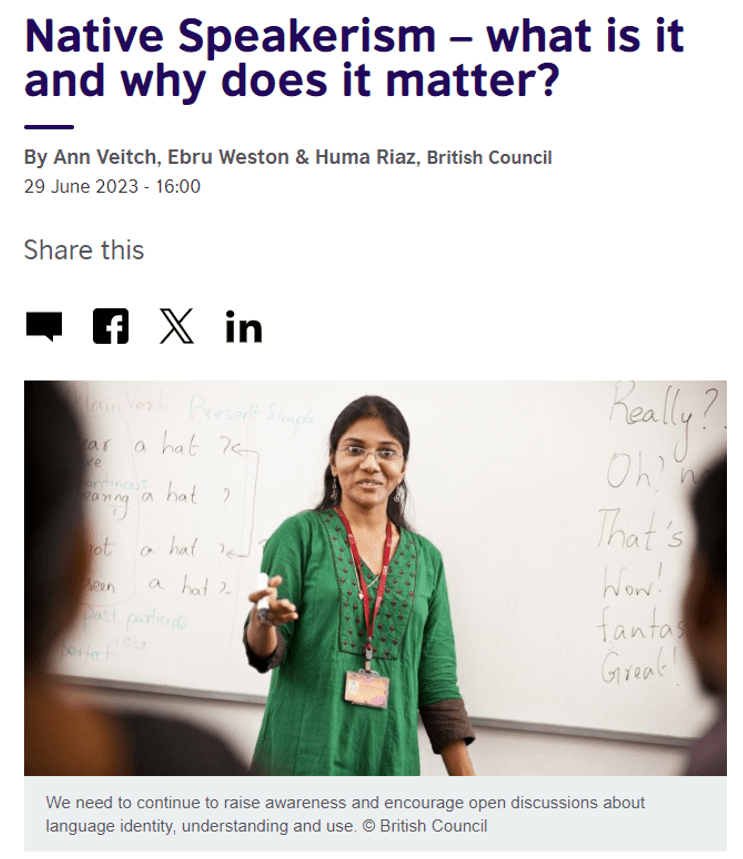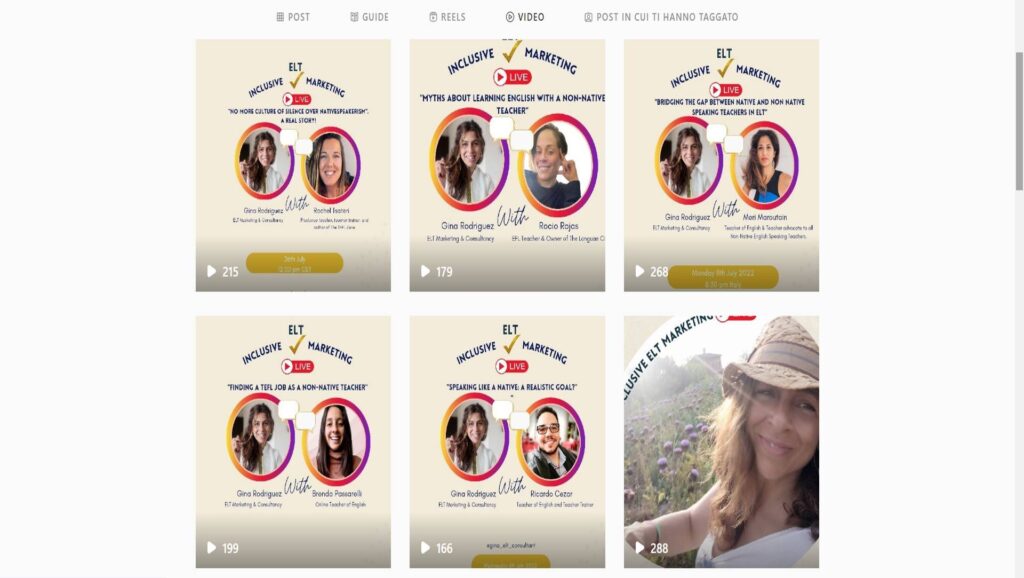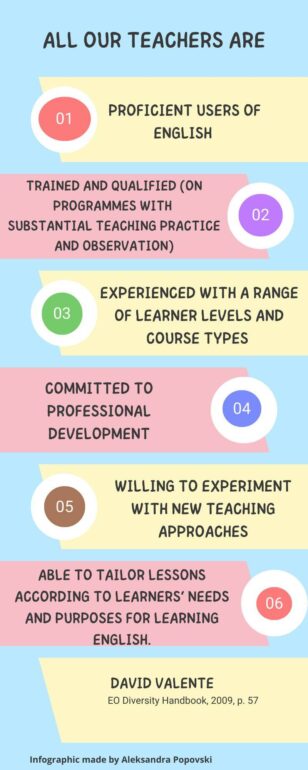Inclusive ELT Marketing for Language Schools
Inclusive ELT Marketing for Language Schools is about marketing language classes in a way that ads and social media posts focus on the school’s unique selling points rather than on the teachers’ nationality.
Hi! I’m Gina Rodriguez and the founder of GR School Marketing. I support language schools in building an engaging social media presence through training and tailored marketing strategies.
Vision: I believe that successful language schools are the ones that teach the language as a tool that empowers students . My services are designed to foster a culture of continuous improvement and innovation so that schools can thrive and every unique offer can be showcased effectively online.

Most Facebook ads for language schools in Italy have “insegnanti madrelingua” (mother tongue teachers) as a unique selling point. Actually, how unique is using “native speaker teachers” as a selling point when all your competitors are saying the same thing? Does it really differentiate you from your competitors? Also, are you including all professional teachers regardless of their nationality?
Facebook ads for TEFL jobs requesting only native speakers are discriminatory and not compliant with Article 21 of EU basic rights which prohibits any discrimination.
Any discrimination based on any ground such as sex, race, colour, ethnic or social origin, genetic features, language, religion or belief, political or any other opinion, membership of a national minority, property, birth, disability, age or sexual orientation shall be prohibited.
Article 21 of EU basic rights
Why am I telling you this? Well, many language school owners and social media marketers here in Italy are still unaware of the legal implications of native-speakerism in Facebook ads (both for recruiting teachers and for promoting courses).
For this reason, I decided to bring this topic to light by discussing it through a series of Instagram Live Chats on Inclusive ELT Marketing and through this blog article. I think it’s important to inform language school owners and suggest how to move to an inclusive marketing practice for language schools.
What’s Native-Speakerism?

If you aren’t sure about what native-speakerism in the ELT industry is all about , I’d suggest you read the article “Native Speakerism: what is it and why it matters” on the British Council’s Blog.
It is an enlightening article which not only explains what native-speakerism is but it also includes the experience, concerns and thoughts of various non-native teachers of English. I highly recommend reading it and share it with colleagues!
Discriminatory ELT Facebook Ads need to stop!
More and more schools in ELT are moving away from discriminatory ads as they realize they need to be compliant with European law. Schools that continue posting discriminatory Facebook Ads are risking being sued.
In February this year, Rachel Tsateri, a highly-qualified Greek EFL teacher and author of the popular TEFL Zone Blog, won the case against a language school based in Germany that had rejected her on the basis of her nationality. You can read her story on her blog “The TEFL Zone” .
Before I go on, I would like to clarify that this blog article is not about non-native language teachers are better than native language teachers or vice-versa. This article is about the discrimination shown in Facebook Ads and how you can and should move away from it.
“This is NOT AGAINST native speakers (NS), and it’s NOT FOR non-native speakers (NNS). It’s FOR ANY speaker/teacher, who should be appreciated and valued for his or her skill, dedication and commitment. Nobody tells you not to hire a NS, and nobody tells you to hire a NNS. When you arrive at the conclusion that the NS is the better choice, so be it. But let it be a choice.
Patrick Mustu Lawyer
“Madrelingua” is what our students and parents want.
Students and parents want the best teacher for them. When inquiring about a language course students and parents often ask if the teachers are “madrelingua” (native speakers) because in their minds a language can only be taught well by a native speaker.
They ignore that being just a native speaker doesn’t imply being a good language teacher. They ask because they are looking for the best conditions for the course they want to buy and they wrongly believe that having a native speaker is a guarantee of success. People don’t even realise how discriminatory this is but it’s so grounded in the culture that it seems normal to ask and request native speakers as language teachers.
However, I don’t blame them. They haven’t got the skills to understand what really makes a good language teacher and it’s the ELT professional or school owner that should educate them on this front.
Schools should educate their customers by clarifying that a good English language teacher is someone that has a qualification to teach the language, has proven experience or is highly motivated to embrace new methodologies.
By simply asking potential students if they can teach you Italian as they are Italian native speakers can help convey the message that being a native speaker is not the most important aspect of being a language teacher. In this way, you move away from being discriminatory toward being inclusive in your ELT marketing.
Qualification and Experience over Passport
Anyone that isn’t a qualified teacher and goes into the ELT classroom will not know :
- About learners’ needs at different ages
- How to motivate students and help them progress
- About classroom dynamics
- How to deal with special educational needs students
- How to keep students focused and motivated
All of these points need to be clear in your conversation with students and potential customers both face to face and on your social media communication. There are many myths about native speaker teachers as I discussed with Rocio Rojas from The Language Circle in a recent Instagram Live Chat . You can check how she deals with those myths coming from customers by watching the chat here. Also, the Live Chat with Ricardo Cezar about “Speaking like a native” can help you gather ideas to educate your students and parents. Watch it here.
Be prepared to debunk those myths and educate your customers through your meetings and social media communication. The Live Chat Series on Inclusive ELT Marketing was organized with the aim to raise awareness about native speakerism and help school owners understand why it is wrong to use it to leverage their language school marketing. Watch the 30min Live Chats on my Instagram account here!

Unique Selling Points for Organic Social Media
A good way to educate your customers in meetings and through social media posts is to focus on which teaching qualifications your teachers hold and what they are about. As an ELTer you know, for example, what a CELTA is. However, people outside the ELT circle will understandably ignore this so make sure you are talking about teaching qualifications and the preparation that is needed to successfully get one and the benefits for the students.
Also, when supporting a Facebook ads campaign for your language courses through organic social media make sure you talk about what implies being a qualified language teacher. Your social media communication should be focusing on the experience your teachers have, the qualifications they hold and the various events of continuous professional development they participate in. Those are your unique selling points, not their nationality!
Focus on how your teachers help students to feel confident in speaking English, to pass exams or to be able to learn a language despite a special educational need. You can do this by means of testimonials and case studies that you will share on your social media. It is also a good idea to include all of these in the FAQs section of your website.
Unique Selling Points for Facebook Ads
Similarly to organic posts you should be looking into moving away from posting Facebook ads for your language courses that are discriminatory and without an added value. Instead, choose an inclusive marketing communication on social media and on your website that will make you stand out.
The infographic here below kindly shared by Aleksandra Popovski on Linkedin and based on David Valente’s content will help you create inclusive ELT marketing communication on social media.

Other Unique Selling Points
Do you have parent meetings? Does your school offer innovative resources and facilities? Is there a book club? Do you organize social events? Is your school accredited by an important board? Have your past students made important achievements thanks to your language courses?
These are strong selling points that you can use in your Facebook Ads and social media posts. Unfortunately, most language schools are taking lots of unique selling points for granted and not using them in ads.
For example, if you do parent meetings then think of the benefits for busy parents and use those as unique selling points.
Conclusion
There are no grounds for focusing on the term “madrelingua” as a unique selling point. We have seen that it isn’t a unique selling point if everyone uses it. What’s more, the term has a discriminatory slant that you probably don’t want to be associated with.
Instead, focus on what makes you truly unique so that your language course advertisement on social media can really stand out and grab your potential students’ attention.
Also, help parents and students understand what they really need to be looking for in an EFL teacher. Constantly remind them of the essential traits for a good EFL teacher through your social media posts and on your website.
If you are willing to go for an inclusive ELT marketing strategy for your language school I can help you through a consultation or a tailored marketing strategy. We can go through your website and social media to find ways to integrate unique selling points to stand out in your local market.
Contact me through this form or reach me at hello@grschoolmarketing.com

If you know someone who would benefit from this article, please consider forwarding it to them.


